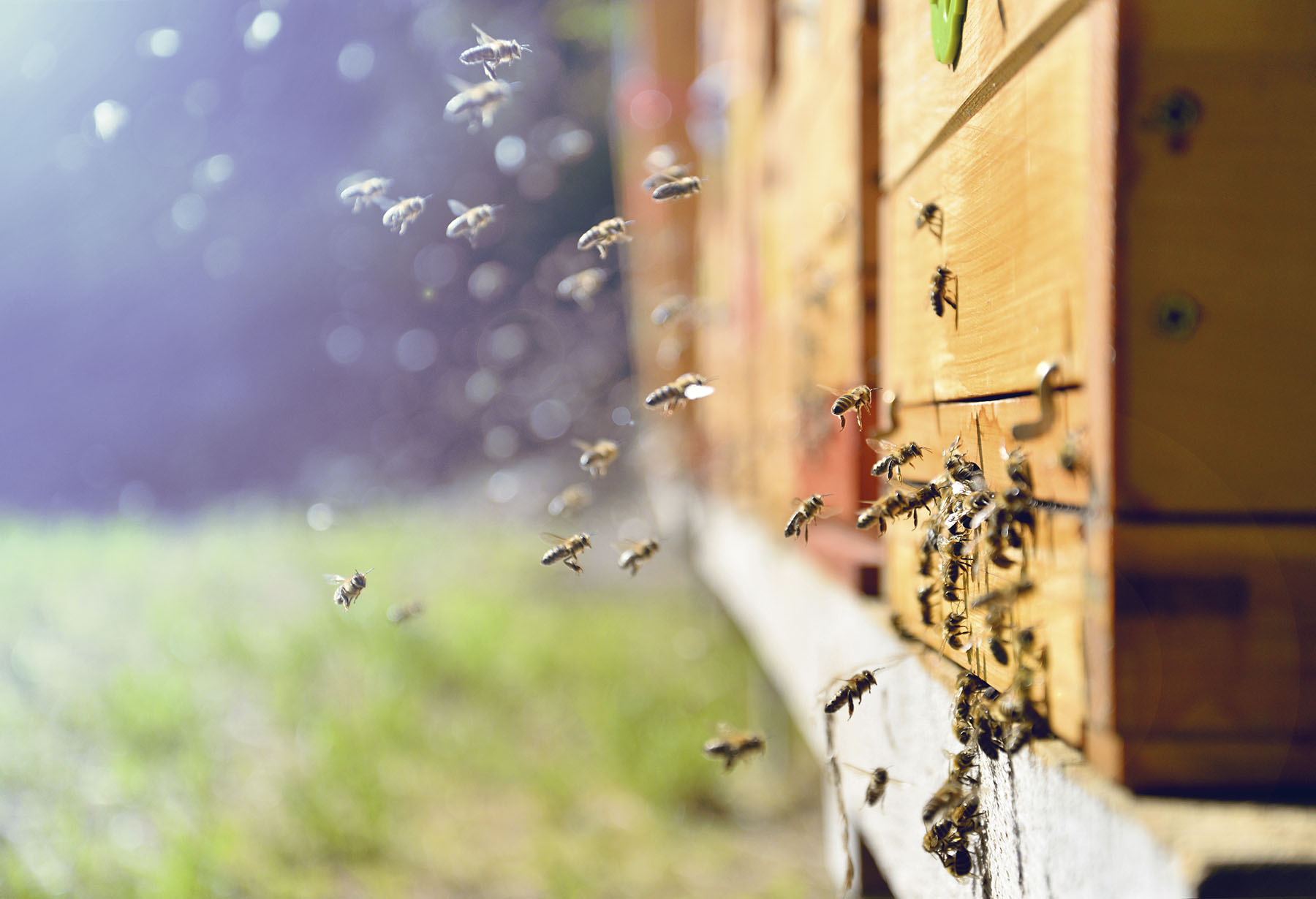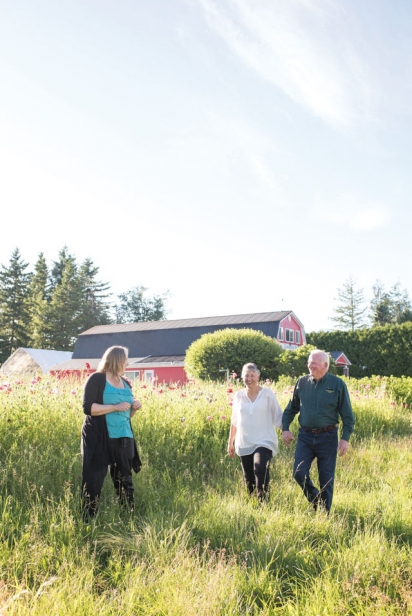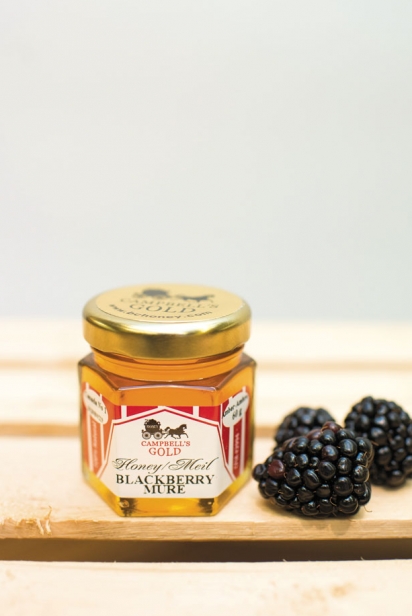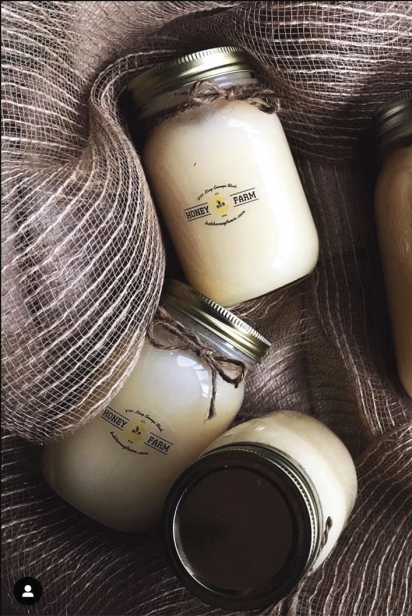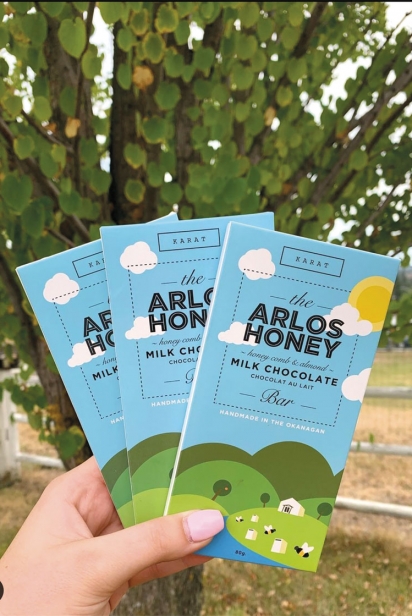A Bee's Terroir
Orange blossom. Chestnut. Acacia. Christmas berry. Just the names of these exquisite honey varietals conjure up sweet dreams of faraway lands where honeybees generate them (in California, France, Italy and Hawaii, respectively).
Just like wine, honey comes in varietals. But while the specific grapes comprising wine make the varietal, honey varietals are determined by where bees forage. The particular trees, shrubs and flowers from which they collect nectar create unique flavours prized by honey enthusiasts.
British Columbian honey comes in varietals, too — alfalfa, blueberry, pumpkin, clover and wildflower — to name a few. Although these may not sound as exotic, don’t be fooled by their humbler names.
B.C. honey is becoming famous on the world stage. You can taste, sweeten and bake with confidence, knowing that this honey is as good as any — and better than most.
To test the theory, visit Campbell’s Gold Honey Farm & Meadery in Aldergrove. The shop overflows with a wide range of varietals from the Lower Mainland, interior and northern B.C. and the Canadian prairies. The family-owned and -operated business prides itself on offering the purest local honey, mead and honey wine — much of which is made on-site.
Judy and her husband, Mike, know how to support happy, healthy bees, because they began beekeeping as hobbyists decades ago, long before they retired from their professions — his as a school teacher and hers as a manager in the federal public service. As passionate amateurs, they attended workshops, online forums and developed their own honey tourism itinerary, visiting countries around the world to sample unique honey varietals where they’re produced.
After retiring from their busy careers, they became even busier as professional beekeepers running their own small business. The Campbells, along with their daughter Jenny (who left her teaching career several years ago to join the business full-time), do everything themselves.
The Campbells’ work includes not only beekeeping tasks, but also tending the flowers and crops that nourish the bees, running beekeeping workshops for amateur beekeepers, providing educational tours for visitors, organizing their purchasing program for speciality B.C. honey and helping nearby smaller beekeepers extract and bottle their honey with the specialized extraction equipment the Campbells have invested in. Their only non-family staff member is the store manager.
“We love it, but it’s busy,” says Judy — the busy-as-bees pun not lost on her. “Right now we’re having trouble getting jars for bottling our late-summer wildflower honey. There’s always something. We’re constantly learning.”
All three family members are lifelong learners; they all have graduate degrees and have successfully completed master beekeeper training.
But you don’t need advanced education to know that pollinators — especially honeybees — need all the help they can get these days." "“We practise ethical beekeeping and do everything we can to keep the bees healthy,” Judy explains. “This includes providing the best forage, treatment for disease when necessary and leaving them plenty of honey when we harvest. We’re also committed to a stable, secure home environment. We don’t truck our bees. Those we send out to pollinate stay close by, and they never go more than once per season. When they come back to our bee yard, they rest and recover.”
One of the few crops the Campbells move their bees to pollinate is the lavender on a nearby flower farm.
“I love all honey… well, except buckwheat,” Judy confesses. “But our lavender and pumpkin honeys are my favourites. They’re so rare, so unique. The bees forage such a small area for this nectar just a few weeks of the year. It’s really special.”
Arlo’s healthy happy bees
In the Okanagan, Kelowna locals can purchase delicious varietal and flavoured honeys — including lavender-infused honey — from Arlo’s Honey Farm. Many Kelownites know Arlo’s from the weekly farmers’ market, but if you visit the farm to see the bees in action and what they’re foraging, you’ll notice Okanagan Lavender & Herb Farm around the corner, as well as the bountiful surrounding farms and orchards.
But that’s not all that Arlo’s bees enjoy. When Arlo’s founder Helen Kennedy started her apiary, she provided her bees with an extensive on-site bee yard containing a range of forage to keep them busy, happy and healthy year-round. Her philosophy — “healthy bees are happy bees” — led to planting Dutch white clover as the base of her golden honey and a long-term nectar source, as well as transforming her market garden around the bees’ needs by increasing berry crops, practising plant rotation and finding crops to span the three seasons when bees need extensive resources. (Bees hibernate in their hives during the winter, when they eat their own honey for nourishment.) These include crocuses to nourish the bees with pollen in early spring, poppies during the pressing heat of summer and asters through the autumn.
These resources create Arlo’s wildflower honey, but there’s much more on offer. As the bees expanded and the business grew, Kennedy began placing hives in nearby bee yards. Upon her recent retirement, Arlo’s boasted an impressive 200 hives in seven bee yards throughout Kelowna, each of which provides unique forage for its particular bee population.
Kennedy has mentored Arlo’s successors — her neighbours, the St. Laurent family — in all aspects of beekeeping to maintain the bees’ health and happiness. The process of transferring the business next door began in early 2020; the coronavirus pandemic created complications, but both parties persevered to prioritize the bees’ health.
The St. Laurents are grateful that most of the bee yards they’re now responsible for are just a few minutes’ drive away. The bees stay put in their permanent homes; the beekeepers are the ones who move around.
“It’s really busy,” says Lisa St. Laurent, who now works the bees with her father, alongside other family members and staff. “But at the same time, it’s so calming to be around the bees. You find focus. And it’s a wonderful way for our family to connect, by working together.”
Lisa maintains an off-farm career, working in high-tech full-time. Her parents, Ken and Sandy, weren’t ready to retire yet and were attracted to the seasonal business. They’d originally considered bringing a couple of hives onto their property, so taking over an established beekeeping and honey business with 200 hives was more than they’d envisioned.
“We were all passionate about bees,” Lisa says. “It’s hard to explain exactly why we got into beekeeping on such a large scale. Something about them just resonated with us. They’re fascinating.”
Her parents appreciate the endless learning opportunities bees offer, as well as the chance to stay active.
It’s busy, but the St. Laurents are never too busy to invest the substantial time it takes to harvest rare honey varietals. Not many beekeepers can commit to small-batch varietal harvests, because the timing is so tricky. “You have to watch for the bloom, and then pull the honey as soon as it’s capped,” St. Laurent explains.
The proximity of their bee yards makes this process more manageable for the St. Laurents.
“One of our bee yards happens to have a large stand of linden trees next door, and another contains an established elderberry field. As well, we just put some bees in Naramata — our first bee yard outside of Kelowna — and there’s sage on the property.”
No matter how labour-intensive the process, they can’t resist these rare varietals. “They’re small harvests — the honey is really meant for connoisseurs,” she says. “Linden is so delicate. Elderberry is very sweet — similar to elderberry cordial. We include them in our special three-pack taster set of tiny jars. They make great gifts, and our customers appreciate them.”
These specialty honey varietals are rarely seen outside of Europe.
“When we do our tastings and compare the specialty varietals using our main varietal — wildflower honey — as the baseline, it’s amazing how clearly the flavours differ. You can really tell which honey came from flowers, which from trees and which from berries.”
When they did their sage harvest, they tested the honey with a local chef renowned for his sensitive palette. He confirmed that the varietal is definitely sage and pronounced the honey unique, with “a fruity and spicy taste.”
But top chefs aren’t the only ones who appreciate Arlo’s Honey Farm’s offerings. In Kennedy’s day, Arlo’s won several awards for its honey at the Inter Provincial Exhibition. The St. Laurents will likely follow in her footsteps.
B.C. honey gets a name
Arlo’s Honey Farm ranks among the top honey brands in the country, according to cansumer.ca. This list ranks purity and taste. Several of the honey producers topping the list are B.C. brands, including the one in first place: BCB Honey from South Surrey.
BCB Honey was founded by former physician Iman Tabari. In his medical practice, he observed how the food we eat can lead to serious health issues such as obesity, diabetes, heart disease, high blood pressure and cancer.
“I saw how our choice of food can make us sick or heal us,” he says.
After leaving the medical field in despair over how processed food affects people in the prime of their lives, Tabari began searching for foods that heal. He found honey at the top of the list. In the process, he became passionate about the importance of honeybees not only for human health, but also for the environment and food security.
“With the alarming decline of bee populations in North America and around the world, I started BCB Honey with the goal of reviving the B.C. bee population,” Tabari explains.
This goal pairs nicely with his determination to boost human health with the highest quality honey. Like many honey advocates, Tabari believes the medicinal qualities of the plant the bees forage infuse the honey with healing capacities. Studies have shown this to be the case with Manuka and buckwheat honey, but few other varietals have been studied.
People have known for millennia that raw honey has healing qualities, but commercial honey is said to lack these qualities, as the nutritious pollen is stripped out through filtration and high-heat pasteurization processes that destroy active enzymes and vitamins in aid of ensuring uniform colour and consistency.
Based on his philosophical beliefs about the importance of bees and his medical opinions about the health benefits of pure, raw, unpasteurized honey, Tabari is obsessed with producing the highest quality honey possible. He’s even willing to keep bee yards in the untouched natural wilderness of B.C.’s far north, travelling there regularly to tend to his bees.
Perhaps not surprisingly, then, given their pristine forage, the honey Tabari’s bees produce is judged some of the best in the world. Cansumer.ca lists it as the top brand in Canada, but BCB is also lauded outside our borders. Specifically, BCB honey recently won first place at the prestigious International Honey Commission competition, as well as a Gold award for the quality of its white floral honey at the London honey awards. This recognition was soon followed by another medal at Apimondia 2019.
Exquisite flavour is what ultimately distinguishes the winners, but quality based on purity is a crucial element; almost half the honeys entered into competition at Apimondia in 2019 flunked out of the first round (before even being tasted) for failing to meet quality standards. According to these rigorous scientific testing methods, BCB honey is some of the purest in the world.
“I’m getting so many emails now,” Tabari says. “People all around the world want to import my honey because the quality is in such high demand. I’m so happy that people want to invest in their health through healthy food.”
You already know how delicious honey is, and you don’t need data or contest results to prove that your food tastes better, and you feel better, when you sweeten with honey. And now you’re also aware that we have literally some of the best honey in the world right at our doorstep.
It makes sense to use local honey as your go-to sweetener, but Canadians aren’t used to paying the real cost of honey. It can seem expensive in comparison with sugar.
But remember this: Honey has always been liquid gold. Before beekeeping became widespread just a few centuries ago, foragers risked life and limb to harvest wild honey. It has always been a rare and precious treat.
If cost has stopped you from switching, then consider shifting honey from the food category of your budget into philanthropy. Ethical beekeeping is capital- and labour-intensive, and it depends upon experts. It’s no coincidence that the beekeepers featured here have advanced degrees and decades of experience: Beekeeping is extremely challenging work that requires exceptionally specialized expertise." "That means when you purchase local honey direct from beekeepers, you’re not just guaranteeing exquisite taste for your palate and the purest quality for your kitchen. You’re also supporting specialized experts who keep alive the honeybees that keep you alive by pollinating most of the key crops providing your daily sustenance. Boosting the local economy and getting a sweet deal while you’re at it is just a bonus.
Honey is cheap at twice the price. And delicious. Everybody wins.
Arlo’s Honey Farm
2290 Saucier Rd., Kelowna, B.C.
arloshoneyfarm.com | 250.764.2883 | @arloshoneyfarm
BCB Honey Farm
4121 King George Blvd., Surrey, B.C.
bcbhoneyfarm.com | 604.722.6867 | @bcbhoney
Campbell’s Gold Honey Farm & Meadery
2595 Lefeuvre Rd., Abbotsford, B.C.
campbellsgold.com | 604.856.2125 | @campbellsgold


